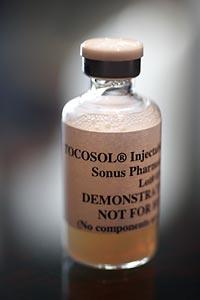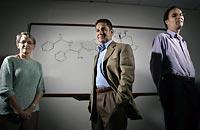Sonus Pharmaceuticals bets on a win-win

What's the difference between "non-inferior" and "superior"? For Sonus Pharmaceuticals, it could be hundreds of millions of dollars.
Sonus, a Bothell biotech company on the road to recovery after skidding to 40 cents a share in 2000, has cannily designed the clinical trial of its make-or-break cancer drug so that meeting either standard will count as a success.
One would be a home run and the other a bunt single, but either way the drug could be approved by the U.S. Food and Drug Administration.
Sonus is now getting within hailing distance of something scientists at Bristol Myers-Squibb and other companies have been striving for almost from the moment the widely used chemotherapy drug Taxol debuted in 1992: to develop an equally effective, less toxic version of its active ingredient, paclitaxel.
This month, Sonus expects to finish enrolling 800 patients with breast cancer in a study comparing its reformulation of the drug, Tocosol Paclitaxel, with the standard drug. Results are expected in the first half of next year.
Many biotech firms, when they reach pivotal clinical trials, try to keep investors happy by swinging for the fence to show their drug is superior to existing treatments. But Sonus designed the trial to go for two targets at once, a more costly approach.
Essentially, the FDA agreed it could approve Tocosol if it's shown to be "non-inferior" to standard paclitaxel at shrinking tumors — a bunt single. But the FDA also agreed to consider evidence that the drug is "superior" — a possible home run for patients and investors.
Of course, there's a third possible outcome: The Sonus drug could perform worse than the standard version. That could break the company.
The demand for a better paclitaxel is large, one reason Abraxis BioScience of Los Angeles introduced a new version last year and Seattle-based Cell Therapeutics has been working on the problem for years.
Paclitaxel and a chemical cousin in branded and generic forms were prescribed 4 million times worldwide last year and had a combined $3.5 billion in sales, according to Sonus market research.
The existing drug's problem is not with effectiveness. The drug, which works by interfering with the rapid-fire cell division that is a hallmark of tumors, sometimes extends lives for months, or years.
The problem is with side effects. The active ingredient, paclitaxel, is not soluble in water, so it must be mixed in a castor-oil type solvent to make it work in the body.
Bad side effects
The mixture hammers healthy bone marrow, making patients anemic and vulnerable to infection. It causes nerve damage in the fingers and toes.
In 2 percent or more of cases, it causes life-threatening reactions, and some patients die.
To withstand the side effects, patients must take steroid premedications, which have side effects of their own.
"We probably call 9-1-1 for reactions to Taxol more than we do for any other reason," said Dr. Peter Eisenberg, a cancer physician in Marin County, Calif.
Sonus' alternative comes in Vitamin-E-based oil nanodroplets, which carry the paclitaxel and make the drug soluble in water.
It may eliminate the need for steroid premedications and is given in a 15-minute infusion, instead of the three-hour infusion of Taxol.
So far, it is hard to judge Tocosol's real worth, because no studies until the one under way have been direct comparisons to regular paclitaxel.
If the trial succeeds, Tocosol could hit the market in 2008.
With Tocosol, Sonus is starting over after failing five years earlier to win FDA approval for an ultrasound contrast agent.
The stock bottomed out at 40 cents a share in December 2000. On Friday, it closed at $4.72 a share.
One critical leap forward came in July 2005, when the FDA signed off on the uncommon design of Sonus' pivotal Tocosol study. The FDA also allowed Sonus to follow the same patients over time to see if tumor shrinkage after 20 weeks translates into patients living longer.
If so, the drug's value could increase after a year or two on the market, without any need for Sonus to do another risky, time-consuming study.
John Crowley, president of Cancer Research and Biostatistics in Seattle, and a consultant to Sonus rival Cell Therapeutics, said there's nothing dubious about the study design. "It even looks halfway clever to me," he said.
Richard Daifuku, Sonus' acting chief medical officer, said the company was trying to minimize risk without sacrificing too much of the drug's rewards. "We're not talking about a billion-dollar blockbuster, but we are talking hundreds of millions," he said.
There is a drawback to having it both ways: The study had to enroll more patients and is expected to cost $45 million.
Exactly how big Tocosol might be commercially depends on how it performs in the trial.
"It all hinges on the data," said Michael Stewart, Sonus' former chief medical officer.
Once the study started last year, Sonus signed a partnership with Schering of Germany to further develop and commercialize the drug. Schering paid a $20 million upfront fee in October and agreed to escalating royalty payments to Sonus of between 15 and 30 percent of future sales.
Then in May, the company further stabilized itself by raising $30 million from investors.
Still risks
Plenty still could go wrong. In March, Bayer — a company with centralized decision-making in Germany — took over Schering, injecting some uncertainty into the partnership with Sonus.
And even if Tocosol proves similar to the standard but with milder side effects, it could be pigeonholed as a minor advance with tepid sales.
"Oncologists are really deadened to 'breakthrough' claims that drug reps come around touting," said Eisenberg, the California cancer doctor. "What I really want to know is, 'Does it make them live longer?"
Luke Timmerman: 206-515-5644 or ltimmerman@seattletimes.com

Located:
BothellFounded: 1991
CEO: Michael Martino
Employees: 60
The latest: This month, it expects to finish enrolling 800 patients in a breast-cancer study comparing its new formulation of paclitaxel with standard paclitaxel, a chemotherapy drug. Sonus' formulation is designed to be less toxic, more convenient to use and possibly more effective.
Largest shareholders: Schering Berlin Venture (15.9 percent), Atlas Master Fund (9.8 percent), Domain Public Equity Partners (6.4 percent)
Cash and investments: $67 million as of June 30
Source: Securities and Exchange Commission filings